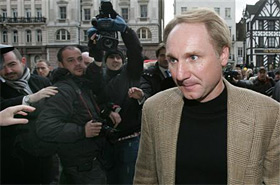 |
 |
 |
 Entertainment | Books | February 2006 Entertainment | Books | February 2006  
Dan Brown In Court For Da Vinci Code Copying Case
 Mike Collett-White - Reuters Mike Collett-White - Reuters


| | Author Dan Brown arrives at the High Court in London, February 27, 2006. (Reuters/Toby Melville) |
Author Dan Brown attended a London court on Monday at the start of a trial in which two historians are accusing him of copying their ideas in his best-selling religious thriller "The Da Vinci Code."

Richard Leigh and Michael Baigent are suing Brown's British publisher Random House for lifting "the whole architecture" of the research that went into their 1982 non-fiction book "The Holy Blood, and the Holy Grail".

Brown's book has more than 36 million copies in print worldwide and has upset Catholics for suggesting Jesus married Mary Magdalene and had a child by her. The same theory is put forward in The Holy Blood, and the Holy Grail.

That storyline is part of the "central theme" which Baigent and Leigh say has been stolen by Brown.

The presiding judge pointed out that in the Internet age, it was difficult for researchers to know the provenance of the material they were reading, and he questioned exactly what the central theme of The Holy Blood, and the Holy Grail was.

Jonathan James, representing the historians at London's High Court, countered: "If you are researching, it is up to you to know what source you are looking at".

He said U.S. writer Brown had used the book, which ironically is also published by Random House and was a bestseller in its own right, not only as a source but as "an essential point of reference".

ANAGRAMS

Commentators have pointed out that a major character in 41-year-old Brown's book, Sir Leigh Teabing, has a name that is an anagram of Leigh and Baigent. A third author of the 1982 book, Henry Lincoln, has decided to stay out of the action.

But Random House, owned by German media conglomerate Bertelsmann, have dismissed the claim as "without merit", and succeeded last October in having a "substantial" part of the case made by the historians dropped.

"As publisher of both The Da Vinci Code and The Holy Blood and The Holy Grail, we are genuinely saddened that two of the three authors of HBHG have chosen to bring this litigation against us," said Gail Rebuck, chief executive of Random House.

"Random House takes no pleasure in defending a legal action that it believes is without merit and we are confident that we will prevail."

Lawyers on both sides of the case have declined to comment on how the trial might affect sales of the record-breaking novel or the distribution of a major Hollywood adaptation which Sony Pictures plans to release in May.

Last August, Brown won a court ruling against another writer, Lewis Perdue, who claimed The Da Vinci Code copied elements of two of his novels, "Daughter of God" and "The Da Vinci Legacy".

Perdue had sought $150 million in damages and asked the court to block distribution of the book and the movie adaptation, which features Tom Hanks alongside French actress Audrey Tautou. | 
 | |
 |



